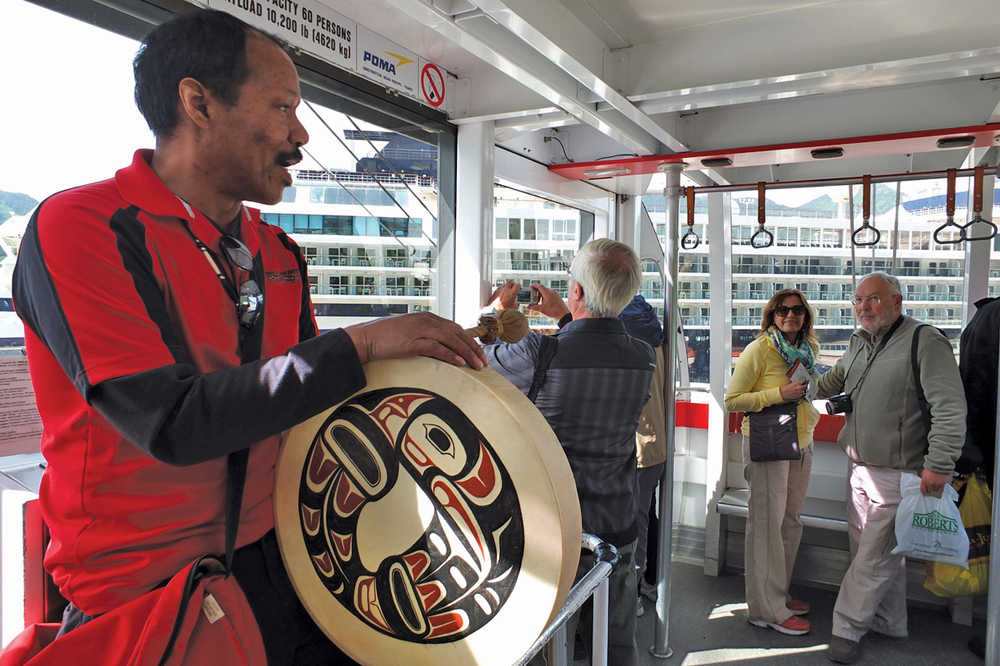JUNEAU — John Perkins starts his daily journeys up Mount Roberts with a few lessons in basic Tlingit.
Then he gets out his drum and breaks into song, prompting his passengers on the Goldbelt Mount Roberts Tram to join in.
“Hoo ha hoo ha haa oh hei,” everyone sings. He points out an eagle’s nest, and a deer. (“We should probably put (the deer) on contract,” he jokes as people begin pointing and taking pictures.)
At the top, he tells the tourists “Gunalcheesh ho ho” (thank you very much). He’s at the top of the tram for a few minutes, dancing, singing and encouraging the little girl of a family from India to join in. She asks to borrow his drum and smiles hugely and shyly as her parents take her picture.
On the way back down, Perkins recites a poem, “Thunderbird Child,” that he wrote in honor of his sister. He tells people about traditional uses for Sitka spruce, hemlock and red alder.
“From the beach to the woods, we gather our goods,” he said. “There’s Sitka spruce for an achey tooth, bruises, boils and burns …”
For the relatively small window he gets to teach people about Tlingit culture, Perkins conveys quite a bit of information.
Perkins, now 53, was raised in Petersburg in the 1960s and 70s, one of 11 siblings, 10 of whom were boys.
His Tlingit name is Daku’dane, and he is an Eagle of the Shangukeidi (Thunderbird) clan.
“What I tell people down South is, we were so poor we were forced to eat king salmon, king crab, Dungeness crab, prawns … (later,) I realized we were never poor, just broke,” he said. “I write about that. When I write about my mother, I point out the subsistence lifestyle.”
As a person of half Tlingit and half African American ancestry, Perkins and his brother were some of the first minorities to live in Petersburg, he said.
His father didn’t have a role in his life, but “black heritage did affect me – because my mom was a musician,” he said. “I tell people my father was black and my mother was an Elvis Presley impersonator.”
His mother, Jin’ku’see’e, was a singer and musician who listened to soul music and was part of a group called The Offbeat Five in Petersburg and Juneau. She still lives in Juneau and works for the Douglas Indian Association. She taught them about hunting, fishing and processing of all kinds of local, wild foods, he said.
In the 1970s, when Perkins was 15, the family moved to Juneau, and for the most part has been here ever since. He completed some school at Juneau-Douglas High School and finished high school in Anchorage.
He started out in poetry by changing the words in songs. When he moved away from Petersburg, he and his best friend kept in touch by sending poems to each other about how cool the other one was, he said.
He characterizes his poetry as “more in the style of Robert Service, as opposed to some kind of slam jam. It’s not the slam tram,” he said, laughing.
“I believe people who write in rhythm and rhyme kind of evolve toward that style,” he said. “I think they evolve toward that because it’s the most difficult way to write. It forces you to be more creative with your words.”
Growing up and during the first part of his professional career, Perkins went by the last name of Valentine – his mother’s last name.
He worked for a while as a features reporter with KTOO, and in TV at KTVA and KTOO TV, he said. He’s also DJ-ed in radio stations in towns up and down the West Coast.
He’s lived in California, Colorado, Florida, Hawaii and Washington, in addition to Alaska. In Washington, he worked with the Chief Seattle Club, which provides “a sacred space to nurture, affirm and renew the spirit of urban Native peoples,” according to its website.
Though he’s not interested in getting involved with anything political here in Juneau, “I have a drum with me at all times, and I really try to instill to the youth, to the younger people, to continue to create … Native expression,” Perkins said. “To continue to evolve, and to maintain the sacred traditions of the different arts … that’s what Tlingits would have been doing regardless of a Western imposition or not. It’s what I do with poetry.”
Being away for many years gives him a better perspective on what an amazing place Southeast Alaska is, he said.
“One thing I’m noticing more and more is the majesty of Southeast Alaska,” he said. “I’m recognizing it for the first time, I guess.”
As a tram conductor, he has a good vantage point from which to do so.
“What I realized it’s that it’s a role that seemingly, I’ve been training for all my life,” he said. “I’m a presenter, I’m a poet, and I’m a Southeast Alaskan.”

